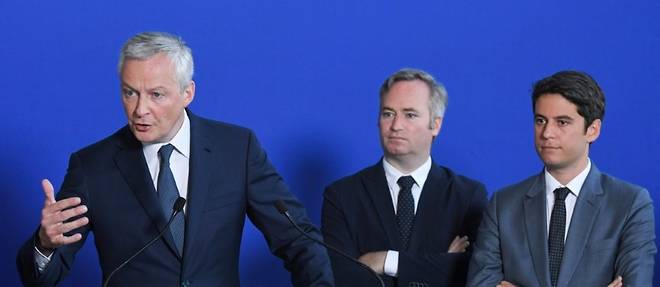Protect “against inflation” while controlling public spending: the Ministers of Economy and Public Accounts detailed their roadmap on Saturday and called on companies to boost purchasing power.
“Our priority with (Prime Minister) Elisabeth Borne will be the protection of the French against inflation,” said Bruno Le Maire (Economy, Finance, Industrial and Digital Sovereignty), promoted to number 2 in the government and endowed with an expanded portfolio. after a first five-year term already spent at Bercy.
“As of tomorrow (Sunday, editor’s note) we will therefore get down to (…) the preparation of the bill on purchasing power” – in reality an amending budget which should be presented after the legislative elections of 12 and 19 June.
While the inflation rate approached 5% over one year in April, Mr. Le Maire said that he “would receive from Monday the economic actors to study with them how they can also participate in the protection of the French against the price increase”.
Among the guests at this meeting scheduled for Monday afternoon will be according to Bercy the main interprofessional employers’ organizations (Medef, CPME) and sectoral (Federation of Commerce and Distribution, French Building Federation).
On the side of the unions, the general secretary of Force Ouvrière Yves Veyrier called on the government to “move from words to deeds” in terms of purchasing power, Saturday on Franceinfo radio.
“The discourse which emphasizes the remuneration of work and wages is going in the right direction, but we have been hearing it for two years”, according to the boss of FO. From now on “we must act on wages, continue to freeze the prices of everyday goods such as energy or food”.
To meet the “challenge” of inflation, “everything must not rest on the State, the burden (of expenses, editor’s note) must be fairly distributed”, underlined Bruno Le Maire.
An appeal from the foot launched to companies so that they too contribute to stimulating purchasing power, for example via the so-called “Macron” bonus (whose president has promised to triple the ceiling), salary increases or “commitments sector” (branch agreements).
After having spent 26 billion euros to counter the soaring prices linked in particular to the war in Ukraine, the State is preparing to disburse several additional billions: general increase in civil servants, revaluation of pensions and social minima, food check or reduction in the contributions of the self-employed are thus announced.
Hence Bercy’s appeal to businesses, when the public deficit reached 6.5% of Gross Domestic Product at the end of 2021 and the debt 112.9% of GDP.
New Minister of Public Accounts, Gabriel Attal has also pledged to be “a relentless craftsman in keeping our public accounts”.
“We must take the path of deleveraging,” insisted the former government spokesman.
President Emmanuel Macron has set himself the ambitious goal of reducing the public deficit to 3% of GDP by 2027, the ceiling theoretically set by European rules, currently being renegotiated.
A key partner of France on European issues and an assumed defender of budgetary rigour, German Finance Minister Christian Lindner also congratulated his “dear colleague Bruno Le Maire” on Twitter on Saturday for his reappointment, before inviting him to “continue” a “close, constructive and trustful cooperation”.
To restore public finances, the French executive is betting on growth and the goal of full employment, a risky bet given the latest INSEE projections.
The National Institute of Statistics thus expects “modest” GDP growth of 0.25% in the second quarter and the Banque de France an increase of 0.2% (after zero growth in the first quarter).
“The Ministry of Public Accounts is that of the promise kept”, despite the “difficult context”, argued Gabriel Attal, who also insisted on his ambitions in terms of purchasing power and the fight against frauds.
05/22/2022 08:08:49 – Paris (AFP) – © 2022 AFP


















